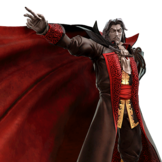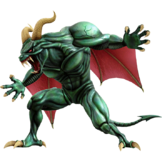Dracula: Difference between revisions
WolfgerLynel (talk | contribs) |
No edit summary |
||
| Line 34: | Line 34: | ||
==In ''Super Smash Bros. Ultimate''== | ==In ''Super Smash Bros. Ultimate''== | ||
{{ImageCaption|File:Dracula Phase 1 SSBU.png|File:Dracula Phase 2 SSBU.png|width1=200x162px|width2=222x162px|align = right|caption=Dracula's two forms as they appear in ''Ultimate''.}}Dracula appears as a [[boss]] in {{SSBU|Classic Mode}} and [[Adventure Mode: World of Light]]. He does battle in a boss area resembling the [[Dracula's Castle]] stage, but with a flat and empty layout. On the stage itself, Dracula appears only [[Background character#Dracula's Castle|as a shadow]]. Dracula's design is based off his official concept art from ''Castlevania: Symphony of the Night'', designed by Ayami Kojima. | |||
Dracula appears as a [[boss]] in {{SSBU|Classic Mode}} and [[Adventure Mode: World of Light]]. He does battle in a boss area resembling the [[Dracula's Castle]] stage, but with a flat and empty layout. On the stage itself, Dracula appears only [[Background character#Dracula's Castle|as a shadow]]. Dracula's design is based off his official concept art from ''Castlevania: Symphony of the Night'', designed by Ayami Kojima. | |||
Dracula's attacks and attributes take inspiration from multiple games in the ''Castlevania'' series: | Dracula's attacks and attributes take inspiration from multiple games in the ''Castlevania'' series: | ||
| Line 52: | Line 50: | ||
==Gallery== | ==Gallery== | ||
<gallery> | <gallery> | ||
Dracula SSBU.png|Screenshot of Dracula as he appears in ''Ultimate''. | |||
SSBU Dracula Screenshot.png|Dracula's appearance in ''[[Super Smash Bros. Ultimate]]'' | SSBU Dracula Screenshot.png|Dracula's appearance in ''[[Super Smash Bros. Ultimate]]'' | ||
SSBU-Dracula's Castle 2.jpg|Dracula's shadow as seen in the [[Dracula's Castle]] stage. | SSBU-Dracula's Castle 2.jpg|Dracula's shadow as seen in the [[Dracula's Castle]] stage. | ||
Revision as of 02:55, December 8, 2018
| Dracula Vlad Ţepeş | |
|---|---|
File:Dracula Artwork.png Official artwork of Dracula from Castlevania: Symphony of the Night. | |
| Universe | Castlevania |
| Debut | Castlevania (1986) |
| Smash Bros. appearances | Ultimate |
| Most recent non-Smash appearance | Castlevania Requiem (2018) |
| Console/platform of origin | Nintendo Entertainment System (Famicom Disk System) |
| Species | Vampire |
| Gender | Male |
| Article on Wikipedia | Dracula (Castlevania) |
Dracula (ドラキュラ, Dracula), full title Count Dracula Vlad Ţepeş (ドラキュラ・ヴラド・ツェペシュ伯爵, Count Dracula Vlad Tepes) is the main antagonist of the Castlevania franchise. He is loosely based on the historical figure Vlad the Impaler, as well as the titular antagonist in the Bram Stoker novel Dracula.
Origin
Although Dracula debuted in the original Castlevania, his origins lie long before the events of the game during the events of Castlevania: Lament of Innocence. It is here that he is revealed to have been a former Crusader named Mathias Cronqvist who was partners with Leon Belmont. Cronqvist returned home from a successful campaign to find that his wife, Elisabeta, had passed away. Her sudden death would scar Cronqvist for life and changed his view on the world and his own existence, eventually declaring war against God for stealing the life of his wife. Cronqvist takes control of an artifact known as the Crimson Stone and becomes a vampire, eventually changing his name to Dracula Vlad Ţepeş.
Dracula's life would then change in 1455 when he met a young woman named Lisa Farenheit, entering his castle of her own accord to learn the art of medicine. To Dracula, this sparked a new faith in humanity and ended his war against God, later settling down and having a son named Adrian. This happiness was not to last when in 1475, Lisa was arrested by paranoid witch-hunters when she was able to prevent an epidemic from spreading. She was burned at the stake, but not before telling her son "Do not hate humans. If you cannot live with them, then at least do them no harm, for theirs is already a hard lot..." and that she would love Dracula for all eternity. Enraged against the humans that took the life of his wife, and not knowing of her merciful plea to his son, Dracula then declared war against humanity. He was stopped by Trevor Belmont, Sypha Belnades, Grant Danasty and his son, now taking up the name Alucard, in 1476.
Nearly two hundred years later, Dracula returned from the grave and fought against Trevor's descendant, Simon. Simon was victorious in his battle, but would receive a seemingly unhealable wound. As it turned out, Dracula had planned to curse Simon with his dying breath that would slowly kill him from the inside-out unless he was revived and destroyed once more. Simon was able to do so, ending Dracula's terror over Transylvania once more.
One hundred years later, Dracula was revived by the Dark Priest Shaft in a black sabbath, organizing a raid on the town of Aljiba, the hometown of Richter Belmont. Richter traversed through the castle, rescuing four maidens who were intended to be the next sacrificial victims, two of whom were Annette, Richter's fiancée, and Maria Renard, his distant relative. Five years after Richter defeated Dracula, the castle mysteriously returned. Richter vanished after going in to investigate, followed by Maria, and then by Alucard, awakened after a centuries-long slumber. It is here that Alucard learns that Shaft had planned to use Richter in his efforts to revive Dracula by brainwashing him into becoming lord of Dracula's castle, with the actual intent of guarding the castle and keeping other potential vampire hunters at bay so that Dracula could be ressurrected uninterrupted; however, Alucard quashed the resurrection of his father, telling him the last words of his wife.
Throughout the 19th Century, Dracula had been repeatedly revived by his loyal followers. By 1897, he began to spread his influence across continental Europe by moving to Carfax Abbey in England. The realtor he invited to the castle, Jonathan Harker, soon began to discover his host's true nature as a vampire, sending letters of correspondence to his friends in London. Harker became directly involved when his wife, Mina, was bitten by Dracula and started developing signs of vampirism. Harker, together with Abraham van Helsing, Arthur Holmwood (whose fiancée Lucy had been bitten as well and had to be killed), John Seward, and Quincey Morris, an American descendant of the Belmont clan, chased Dracula back to his castle in Romania, where Morris dealt the final blow with a bowie knife, dying shortly afterwards.
Dracula returned twice more during both World Wars, dealing with Quincey's son John and grandson Jonathan, as well as their respective companions Eric Lecarde and Charlotte Aulin, before a final battle broke out on July 17th, 1999. Dracula was destroyed, once and for all, by Julius Belmont, together with a Belnades clansman, a priest from the Hakuba Shrine in Japan, Alucard, and members of the US Military. Although Dracula died, portions of his power was passed down to those who were born on the day of his death, and his soul reincarnated as a Japanese boy of Romanian descent named Soma Cruz in the year 2017. Soma only learned of his heritage during the solar eclipse of 2035 when the castle manifested in a solar eclipse over Japan, but still he was able to resist Dracula's influence even as he felt drawn closer and closer to the castle, going so far as to make Julius promise to kill him should he indeed become Dracula.
One year later, Soma braved a replica of Dracula's castle to stop a cult that sought to resurrect Dracula through the aid of others who had inherited portions of his power. Though he nearly succumbed to Dracula's influence, he again refused to let the vampire reincarnate through him and ultimately thwarted the cult's plans. An alternate "what if" scenario has Soma being corrupted into becoming Dracula, forcing Julius, Yoko Belnades, and Alucard to defeat the returned vampire lord.
In Super Smash Bros. Ultimate
Dracula appears as a boss in Classic Mode and Adventure Mode: World of Light. He does battle in a boss area resembling the Dracula's Castle stage, but with a flat and empty layout. On the stage itself, Dracula appears only as a shadow. Dracula's design is based off his official concept art from Castlevania: Symphony of the Night, designed by Ayami Kojima.
Dracula's attacks and attributes take inspiration from multiple games in the Castlevania series:
- Hellfire, a set of three fireballs appearing in the original Castlevania.
- Dark Inferno, a wave of alternating fireballs that must be ducked or jumped over from Castlevania: Rondo of Blood.
- A circling variant of three Dark Infernos that alternate between moving clockwise and counter-clockwise, first appearing as an attack for Graham Jones in Castlevania: Aria of Sorrow.
- Fire pillars that resemble a combination of his primary attack in Castlevania III: Dracula's Curse, Dario's pillars in Castlevania: Dawn of Sorrow, and one of his attacks in Castlevania: Harmony of Despair.
- Bat Moon, a swarm attack where Dracula rushes in the form of several bats, referencing his attack in Castlevania: Portrait of Ruin.
- Dracula can also transform into his second form from Rondo of Blood.
- He can only be hurt in the head, his common weakpoint since his first appearance. Attacks below this area cause a misty effect, resembling Alucard's mist transformation.
The Fighters that are assigned to fight Dracula in Classic Mode are so far Luigi, Pac-Man, Simon, and Richter.
Gallery
Dracula's appearance in Super Smash Bros. Ultimate
Dracula's shadow as seen in the Dracula's Castle stage.
Trivia
- Dracula casts a shadow in the Dracula's Castle stage, despite lore frequently depicting vampires as being unable to cast shadows (or reflections) as they lack a soul.
- This could be a reference to the 1992 film Bram Stoker's Dracula, where Dracula has a living shadow in his form in order to divert suspicion from Harker.
- Not counting Odin from Final Fantasy nor Dr. Kawashima, Dracula is the first major character in the Super Smash Bros. series (along with his fellow monsters) to not originate from a video game.
- His debut novel of the same name is also featured in the main canon of the Castlevania series.
References
External Link
- Article on the Castlevania Wiki.
| Bosses | |
|---|---|
| Super Smash Bros. | Master Hand · Metal Mario · Giant Donkey Kong · Fighting Polygon Team |
| Melee | Master Hand · Crazy Hand · Giga Bowser · Fighting Wire Frames (Male · Female) |
| Brawl | Master Hand · Crazy Hand · Petey Piranha · Rayquaza · Porky · Galleom · Ridley · Duon · Meta Ridley · Tabuu · Fighting Alloy Team (Red · Blue · Yellow · Green) · False characters |
| Smash 4 | Master Hand · Crazy Hand · Master Core · Fighting Mii Team |
| Ultimate | Master Hand · Crazy Hand · Rathalos · Galleom · Giga Bowser · Galeem · Dharkon · Dracula · Ganon · Marx · Fighting Mii Team · False characters |
|
| |
|---|---|
| Fighters | Simon (SSBU) · Richter (SSBU) |
| Assist Trophy | Alucard |
| Boss | Dracula |
| Stage | Dracula's Castle |
| Item | Death's Scythe |
| Other | Dracula's Castle |
| Spirits | Spirits |
| Music | Ultimate |





